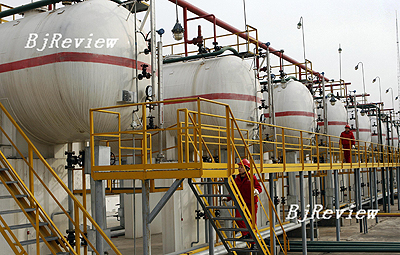|

On December 18, 2007, the National Development and Reform Commission (NDRC), China's top economic planner, announced that the national oil reserve center has been officially launched. The supervisory system over the oil reserves has three levels: the energy department of the NDRC, the oil reserve center, and the reserve bases.
Information on the NDRC website reveals that the newly established national oil reserve center will serve as executive organ for the oil reserve system, responsible for constructing and managing oil reserve bases, making use of the oil reserves, as well as keeping an eye on the movement of global oil supply and demand.
Deeply concerned by fluctuating oil prices, China is determined to standardize its oil reserves.
The NDRC statement said, "Coordinated use of strategic petroleum reserves increases energy security for net oil-importing countries during times of significant supply disruption."
Cao Xin, energy expert with the Party School of the Central Committee of the Communist Party of China, pointed out that judging by international standards, setting up an oil reserve center is a way to cope with emergencies and also to keep oil prices stable. Cao said the first function is most important at present.
Future responsibilities
The national oil reserve center will be independent from the energy department of the NDRC, though also supervised by the NDRC.
The government will invest in building up oil reserve bases and PetroChina, Sinopec and Sinochem will be in charge of construction. After being completed, the bases will be managed by the national oil reserve center.
Zhou Fengqi, an expert with the Energy Institute of the NDRC's Macro-Economic Research Institute, said the current priority of the oil reserve center is to buy oil.
As for the source of oil reserves, Cao said China is now increasingly dependent on the international market. Statistics from the Ministry of Commerce show that in the first 10 months of 2007, China imported 137 million tons of crude oil, and was 49 percent dependent on oil imports. As a result, Cao said it would be impossible to build oil reserve bases with domestic crude oil and the country will need to rely on foreign imports.
Careful planning
Surging international oil prices might be the biggest challenge for the new national oil reserve center. China is the second largest oil consumer in the world. A lack of self-sufficiency could put China in a risky position if the international oil market destabilizes. Therefore, it is an important measure to safeguard national energy security faced with possible international emergencies.
Zhou said international oil prices are very high at present and it is not the best time to buy. On December 26, 2007, the price of benchmark crude oil futures traded on the New York Mercantile Exchange closed at $95.97 per barrel, double the price in the beginning of 2007.
People are concerned that international oil prices will rise on the increasing demand from China. Niu Li, analyst with State Information Center, said the country's strategic oil reserve has not reached the average level of 90-day use. Even if China reached the level, it would still be hard to influence the international market.
Niu said that crude oil trade is totally open to every country. Unless something really catastrophic happens, no country can manipulate its price. The purpose of establishing such a reserve center is not to adjust international crude oil prices, but to guarantee state energy safety.
China has been preparing for the reserve bases since 2003. According to the plan, China will complete the construction in 15 years, which will be divided into three phases with estimated total investment of over 100 billion yuan ($13.7 billion). In the first phase, the reserve amount will reach 10 million to 12 million tons, and will store 28 million tons respectively in the second and third phase.
In October 2006, the reserve base in Zhenhai of Zhejiang was supplied with 32.7 million barrels, mostly from Russia. By 2010, China will build its strategic oil reserve equivalent to the total amount of 30 days of imports.
China is now in the second phase of reserve base construction.
Chen Deming, Vice Minister of Commerce, said the current strategic oil reserve stands between 2 million and 3 million tons, far less than the amount reserved by developed countries. He hopes China could narrow the reserve gap with the developed countries within 15 years.
| 